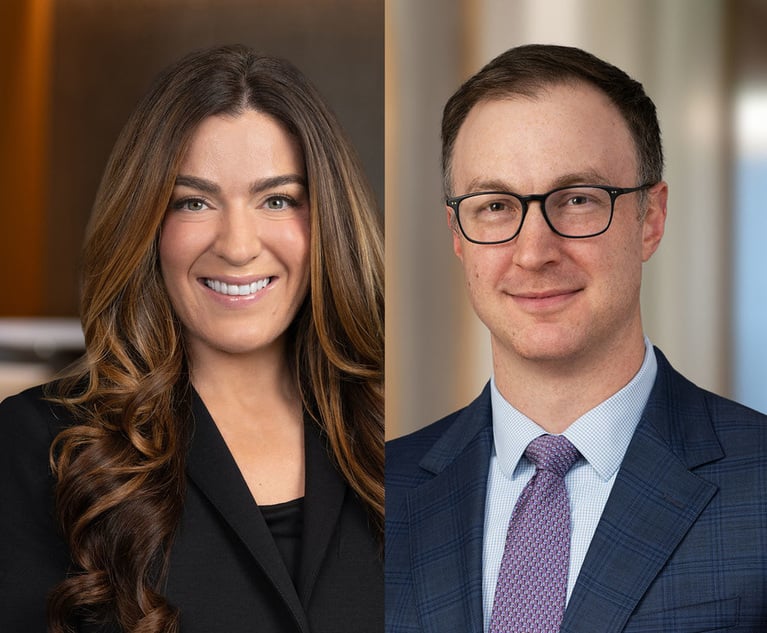 (Photo: Shutterstock.com)
(Photo: Shutterstock.com)The Rise of the Mega Firm: Legal Departments Face Difficult Questions Amid Law Firm Mergers
An uptick in law firm M&A activity is creating bigger firms that have deeper benches and cover more practice areas and jurisdictions. But bigger firms might also mean higher rates, more conflicts and fewer options for outside counsel.
April 20, 2020 at 10:00 AM
8 minute read
The original version of this story was published on Corporate Counsel
Cameron Findlay, general counsel of global food processing and commodities trading company Archer Daniels Midland Co., says it seems like a near-weekly occurrence that one of his outside law firms calls to announce a forthcoming merger with another firm or to say that they're considering a merger.
This "wave of consolidation," as Findlay describes it, has been building. But the trend began to accelerate in 2018 and 2019, when mergers and acquisitions of U.S. law firms exceeded 200 in total, setting back-to-back records for M&A activity in the legal industry.
And then came along COVID-19, which brought a halt to the face-to-face meetings and negotiations that are the foundations of mergers. But that's not to say law firms abruptly stopped being interested in M&A deals. Many are waiting for the dust to settle, according to legal consultants.
"It's not that interest has disappeared, but merger discussions require significant management attention and in-person meetings, and neither are available right now," says Altman Weil principal Eric Seeger. "We're going to see new merger announcements go to nearly zero for a while as firms recalibrate.
"Much of the merger activity over the past few years was driven by small firms with problems, and we're going to see many more small firms with problems," he adds. "So that end of the merger market will pick up at some point."
Law firm mergers have double-edged consequences for legal departments. Mega firms have deeper benches and a broader geographic reach. But consolidation can breed conflict, lead to billing rate hikes and shrink the pool of firms for legal departments to choose from when considering outside counsel.
"In terms of the benefits to in-house counsel, for a big multinational company like ADM, I have to admit that it's nice to know that our principal firms can handle a broader array of matters in a broad array of geographies," Findlay says. "It is kind of nice to call up if you have an investigation that crosses national boundaries, and say, 'Can you handle it without hiring other firms in other countries?'"
But, he adds, "I've had at least a couple questions that have arisen … because law firms have merged with firms with which we've had disputes in the past. And so we've had to work through those sorts of things."
Another more common type of conflict arises when firms that represent competitors merge, notes Jason Winmill, managing partner at Boston-based legal department consulting firm Argopoint.
"It's not just that they were mean to us or nasty to us in another matter," Winmill says. "Law firms often work on one side of the street or the other. In-house counsel are looking for the merged firm to demonstrate that the side of the street they want to be on in the future is their side of the street."
'A Talent Business'
As Faegre Baker Daniels approached its megamerger with Drinker Biddle & Reath, Thomas Froehle, co-chair of the newly created Faegre Drinker Biddle & Reath, says the firms were thinking constantly about how the deal, which was finalized Feb. 1, would affect their clients.
"With hundreds of clients I think there have been a handful of engagements we've had to maneuver around, but I'm not aware of clients we've had to disengage with" because of conflicts, Froehle says.
His fellow Faegre Drinker co-chair, Andrew Kassner, notes that the two firms and their clients were "incredibly compatible," which resulted in "few real conflicts." He adds that the clients were "impressed with the overwhelming business case" for the merger.
 Cameron Findlay, general counsel of ADM, in Chicago, IL. March 10, 2015. Photo by Andrew Collings. (HANDOUT – OK TO USE)
Cameron Findlay, general counsel of ADM, in Chicago, IL. March 10, 2015. Photo by Andrew Collings. (HANDOUT – OK TO USE)
"We have found that our clients generally appreciate a high level of expertise in their sector and having a really coordinated approach across regulatory, business and litigation services," Kassner says. "In the end, this is a talent business and having that talent wins the day as far as clients are concerned."
Lisa Smith, a Washington, D.C.-based law firm consultant at Fairfax Associates, asserted that the primary motivation behind the uptick in merger activity is a desire to be more relevant to clients, particularly large corporate clients that have complex needs.
At the same time, though, some companies would prefer, at least in certain instances, to spread outside work to a stable of smaller firms, which can provide greater flexibility and bandwidth to legal departments along with cost savings.
"An interesting aspect of this [M&A activity] is that you may have fewer choices," Smith says. Last year, there was a significant increase in large firms gobbling up smaller firms. Of the 115 mergers announced, 101, or about 88%, involved firms with two to 20 lawyers, according to Altman Weil. The acquired firms in 2019 had an average of 18 lawyers, compared with 27 in 2018.
Mega firms are "really seeing a potential payoff in bolstering their ranks by picking up smaller firms," says Jim Wilber, head of Altman Weil's corporate consulting practice. "There is a direct correlation between law firm size and their hourly rates. A lot of times you might be working with a smaller firm because you didn't need the hugest firm on the matter."
'A Touchy, Dicey Issue'
When smaller firms are absorbed into larger firms, billing rates can grow and clients of the acquired firm might suddenly feel as if they don't matter as much.
"It's often easier for a client to be important and feel important at a smaller firm. It's often harder at a bigger firm," says Winmill, the legal consultant in Boston. "But the big issue that people are concerned about is price changes.
"I'm not familiar with any of these mergers where the result of the merger is that prices go down afterward," he adds.
Findlay, ADM's top lawyer, has a similar view, saying he assumed that "law firms are not doing this to make less money. Unlike when companies merge to gain cost savings, you just don't see that as much with law firms."
Froehle and Kassner, co-chairs of Faegre Drinker, disagree. They stress that their firm expanded so it could better serve its clients, not because it was looking for a way to increase rates.
"When you bring deeper expertise and broader coverage to the table, that promotes efficiency; and that, in turn, promotes value. That's what corporate legal departments are looking for today: value," Kassner says.
On the opposite side of the consolidation coin, issues also are bubbling up after companies merge, according to Christoph Feddersen, vice president and general counsel of Collins Aerospace.
He's noticed that law firms were billing his company far less than some of the companies that Collins acquired, which he said has led to some "interesting discussions" about billing rates in the wake of a merger.
"[The law firms] obviously want to do this on legacy measures going forward because they base their business case on that and you just need to make them understand that that's not in the best interest of the customer," Feddersen says. "It's a little bit of a touchy, dicey issue because you don't want to offend the firms either."
'Beyond Anyone's Control'
For legal departments that are unhappy with a firm in the wake of a merger, the choice of staying or leaving can be difficult. Especially if the legal department and firm are in the middle of litigation or a project. In that common scenario, companies grapple with the tough decision of remaining in an unsatisfactory relationship or dealing with a service disruption.
Findlay says ADM opted to work things out with their outside firms even after conflicts arose and the situation, as he described it, became "kind of awkward." It's hardly surprising that ADM decided to stay with the firms in question.
"It's not nearly as simple of a decision to make," Wilber says. "There's a lot more involved than just the cost of services."
More in-house leaders will likely face the stay-or-go dilemma as the merger train rolls along—at least 16 law firms merged during the first two months of 2020, according to Altman Weil.
Another question with a difficult answer is whether further consolidation of the legal industry is good for legal departments. And it's a question that Wilber answers without hesitation. "It doesn't matter," he says. "It's a force beyond anyone's control to stop, so you better figure out how you're going to ride the wave rather than get crushed by it."
This content has been archived. It is available through our partners, LexisNexis® and Bloomberg Law.
To view this content, please continue to their sites.
Not a Lexis Subscriber?
Subscribe Now
Not a Bloomberg Law Subscriber?
Subscribe Now
NOT FOR REPRINT
© 2025 ALM Global, LLC, All Rights Reserved. Request academic re-use from www.copyright.com. All other uses, submit a request to [email protected]. For more information visit Asset & Logo Licensing.
You Might Like
View All
The Week in Data Jan. 2: A Look at Legal Industry Trends by the Numbers

Chair of Montgomery McCracken Decamps for Morgan Lewis

Patent Disputes Over SharkNinja, Dyson Products Nearing Resolution
Law Firms Mentioned
Trending Stories
Who Got The Work
Michael G. Bongiorno, Andrew Scott Dulberg and Elizabeth E. Driscoll from Wilmer Cutler Pickering Hale and Dorr have stepped in to represent Symbotic Inc., an A.I.-enabled technology platform that focuses on increasing supply chain efficiency, and other defendants in a pending shareholder derivative lawsuit. The case, filed Oct. 2 in Massachusetts District Court by the Brown Law Firm on behalf of Stephen Austen, accuses certain officers and directors of misleading investors in regard to Symbotic's potential for margin growth by failing to disclose that the company was not equipped to timely deploy its systems or manage expenses through project delays. The case, assigned to U.S. District Judge Nathaniel M. Gorton, is 1:24-cv-12522, Austen v. Cohen et al.
Who Got The Work
Edmund Polubinski and Marie Killmond of Davis Polk & Wardwell have entered appearances for data platform software development company MongoDB and other defendants in a pending shareholder derivative lawsuit. The action, filed Oct. 7 in New York Southern District Court by the Brown Law Firm, accuses the company's directors and/or officers of falsely expressing confidence in the company’s restructuring of its sales incentive plan and downplaying the severity of decreases in its upfront commitments. The case is 1:24-cv-07594, Roy v. Ittycheria et al.
Who Got The Work
Amy O. Bruchs and Kurt F. Ellison of Michael Best & Friedrich have entered appearances for Epic Systems Corp. in a pending employment discrimination lawsuit. The suit was filed Sept. 7 in Wisconsin Western District Court by Levine Eisberner LLC and Siri & Glimstad on behalf of a project manager who claims that he was wrongfully terminated after applying for a religious exemption to the defendant's COVID-19 vaccine mandate. The case, assigned to U.S. Magistrate Judge Anita Marie Boor, is 3:24-cv-00630, Secker, Nathan v. Epic Systems Corporation.
Who Got The Work
David X. Sullivan, Thomas J. Finn and Gregory A. Hall from McCarter & English have entered appearances for Sunrun Installation Services in a pending civil rights lawsuit. The complaint was filed Sept. 4 in Connecticut District Court by attorney Robert M. Berke on behalf of former employee George Edward Steins, who was arrested and charged with employing an unregistered home improvement salesperson. The complaint alleges that had Sunrun informed the Connecticut Department of Consumer Protection that the plaintiff's employment had ended in 2017 and that he no longer held Sunrun's home improvement contractor license, he would not have been hit with charges, which were dismissed in May 2024. The case, assigned to U.S. District Judge Jeffrey A. Meyer, is 3:24-cv-01423, Steins v. Sunrun, Inc. et al.
Who Got The Work
Greenberg Traurig shareholder Joshua L. Raskin has entered an appearance for boohoo.com UK Ltd. in a pending patent infringement lawsuit. The suit, filed Sept. 3 in Texas Eastern District Court by Rozier Hardt McDonough on behalf of Alto Dynamics, asserts five patents related to an online shopping platform. The case, assigned to U.S. District Judge Rodney Gilstrap, is 2:24-cv-00719, Alto Dynamics, LLC v. boohoo.com UK Limited.
Featured Firms
Law Offices of Gary Martin Hays & Associates, P.C.
(470) 294-1674
Law Offices of Mark E. Salomone
(857) 444-6468
Smith & Hassler
(713) 739-1250









